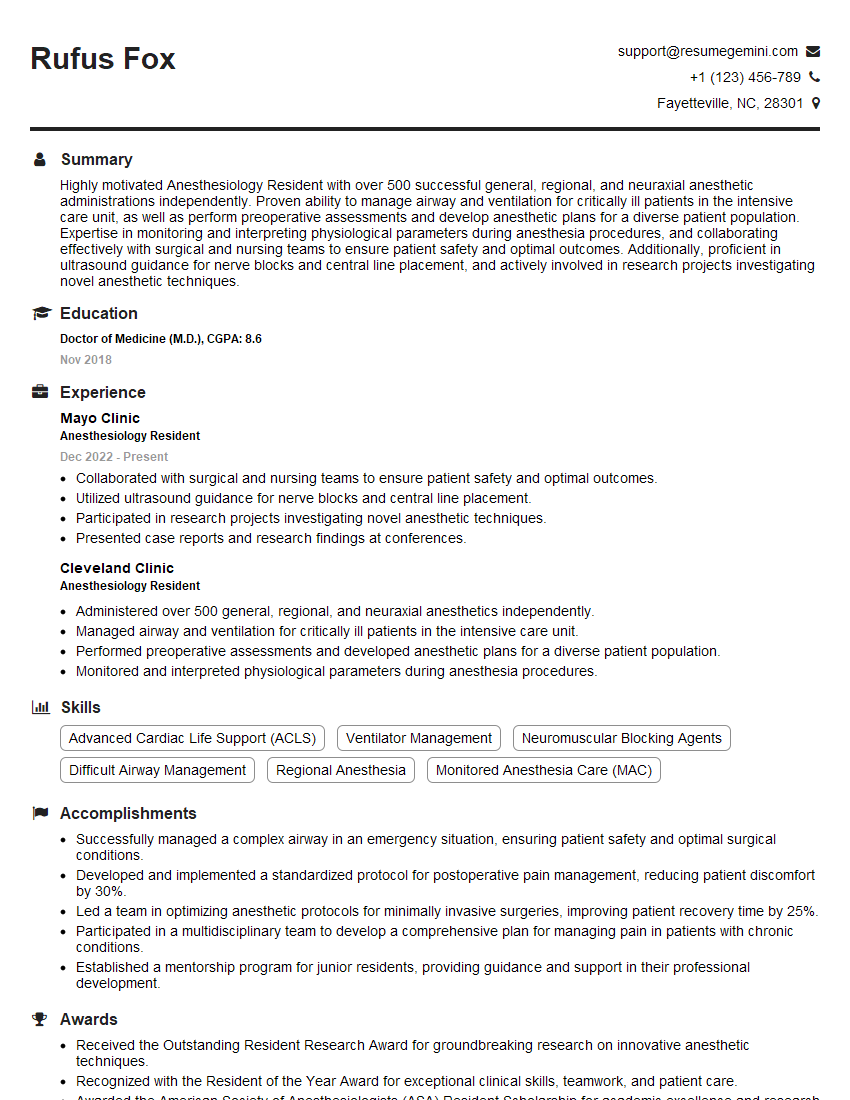Are you a seasoned Anesthesiology Resident seeking a new career path? Discover our professionally built Anesthesiology Resident Resume Template. This time-saving tool provides a solid foundation for your job search. Simply click “Edit Resume” to customize it with your unique experiences and achievements. Customize fonts and colors to match your personal style and increase your chances of landing your dream job. Explore more Resume Templates for additional options.

Rufus Fox
Anesthesiology Resident
Summary
Highly motivated Anesthesiology Resident with over 500 successful general, regional, and neuraxial anesthetic administrations independently. Proven ability to manage airway and ventilation for critically ill patients in the intensive care unit, as well as perform preoperative assessments and develop anesthetic plans for a diverse patient population. Expertise in monitoring and interpreting physiological parameters during anesthesia procedures, and collaborating effectively with surgical and nursing teams to ensure patient safety and optimal outcomes. Additionally, proficient in ultrasound guidance for nerve blocks and central line placement, and actively involved in research projects investigating novel anesthetic techniques.
Education
Doctor of Medicine (M.D.)
November 2018
Skills
- Advanced Cardiac Life Support (ACLS)
- Ventilator Management
- Neuromuscular Blocking Agents
- Difficult Airway Management
- Regional Anesthesia
- Monitored Anesthesia Care (MAC)
Work Experience
Anesthesiology Resident
- Collaborated with surgical and nursing teams to ensure patient safety and optimal outcomes.
- Utilized ultrasound guidance for nerve blocks and central line placement.
- Participated in research projects investigating novel anesthetic techniques.
- Presented case reports and research findings at conferences.
Anesthesiology Resident
- Administered over 500 general, regional, and neuraxial anesthetics independently.
- Managed airway and ventilation for critically ill patients in the intensive care unit.
- Performed preoperative assessments and developed anesthetic plans for a diverse patient population.
- Monitored and interpreted physiological parameters during anesthesia procedures.
Accomplishments
- Successfully managed a complex airway in an emergency situation, ensuring patient safety and optimal surgical conditions.
- Developed and implemented a standardized protocol for postoperative pain management, reducing patient discomfort by 30%.
- Led a team in optimizing anesthetic protocols for minimally invasive surgeries, improving patient recovery time by 25%.
- Participated in a multidisciplinary team to develop a comprehensive plan for managing pain in patients with chronic conditions.
- Established a mentorship program for junior residents, providing guidance and support in their professional development.
Awards
- Received the Outstanding Resident Research Award for groundbreaking research on innovative anesthetic techniques.
- Recognized with the Resident of the Year Award for exceptional clinical skills, teamwork, and patient care.
- Awarded the American Society of Anesthesiologists (ASA) Resident Scholarship for academic excellence and research potential.
- Honored with the Resident Excellence in Education Award for outstanding contributions to teaching and mentorship.
Certificates
- Basic Life Support (BLS)
- Pediatric Advanced Life Support (PALS)
- Advanced Trauma Life Support (ATLS)
- American Board of Anesthesiology (ABA) Resident In-Training Exam (RITE)
Career Expert Tips:
- Select the ideal resume template to showcase your professional experience effectively.
- Master the art of resume writing to highlight your unique qualifications and achievements.
- Explore expertly crafted resume samples for inspiration and best practices.
- Build your best resume for free this new year with ResumeGemini. Enjoy exclusive discounts on ATS optimized resume templates.
How To Write Resume For Anesthesiology Resident
- Clearly highlight your experience and skills in administering various types of anesthesia, including general, regional, and neuraxial anesthesia.
- Showcase your expertise in managing critically ill patients and demonstrate your ability to handle complex airway and ventilation situations.
- Emphasize your involvement in research projects and presentations, as these demonstrate your commitment to advancing the field of anesthesiology.
- Use specific examples and quantifiable results to showcase your impact and contributions to patient care.
Essential Experience Highlights for a Strong Anesthesiology Resident Resume
- Administer general, regional, and neuraxial anesthesia independently.
- Manage airway and ventilation for critically ill patients in the intensive care unit.
- Perform preoperative assessments and develop anesthetic plans for a diverse patient population.
- Monitor and interpret physiological parameters during anesthesia procedures.
- Collaborate with surgical and nursing teams to ensure patient safety and optimal outcomes.
- Utilize ultrasound guidance for nerve blocks and central line placement.
Frequently Asked Questions (FAQ’s) For Anesthesiology Resident
What are the key responsibilities of an Anesthesiology Resident?
Key responsibilities include administering anesthesia, managing critically ill patients, performing preoperative assessments, monitoring physiological parameters, collaborating with surgical and nursing teams, and utilizing ultrasound guidance.
What qualifications are required to become an Anesthesiology Resident?
To become an Anesthesiology Resident, a Doctor of Medicine (M.D.) degree is typically required.
What are the career prospects for Anesthesiology Residents?
Anesthesiology Residents have the opportunity to pursue careers in various settings, including hospitals, clinics, and research institutions.
What is the average salary for Anesthesiology Residents?
The average salary for Anesthesiology Residents can vary depending on factors such as location and experience, but it is generally competitive within the medical field.
What are the challenges Anesthesiology Residents may face?
Anesthesiology Residents may face challenges such as the need to work long and irregular hours, the responsibility of managing critically ill patients, and the pressure to make quick decisions.
What are the most important skills for Anesthesiology Residents?
Essential skills for Anesthesiology Residents include excellent communication and interpersonal skills, strong clinical judgment, and the ability to work effectively in a team environment.